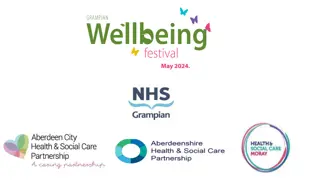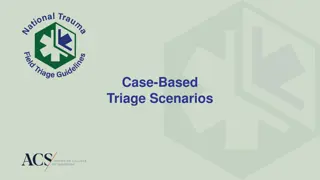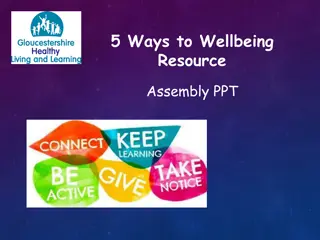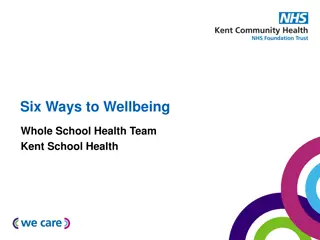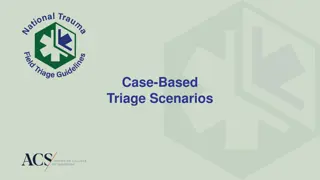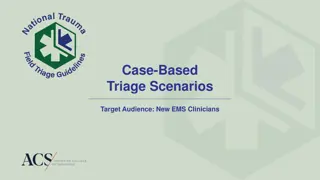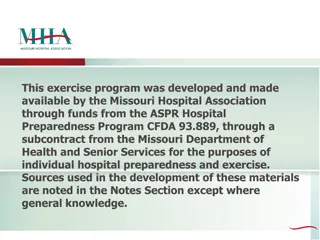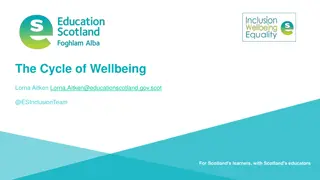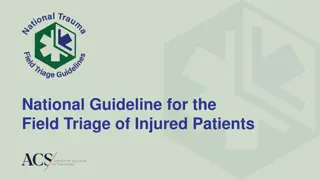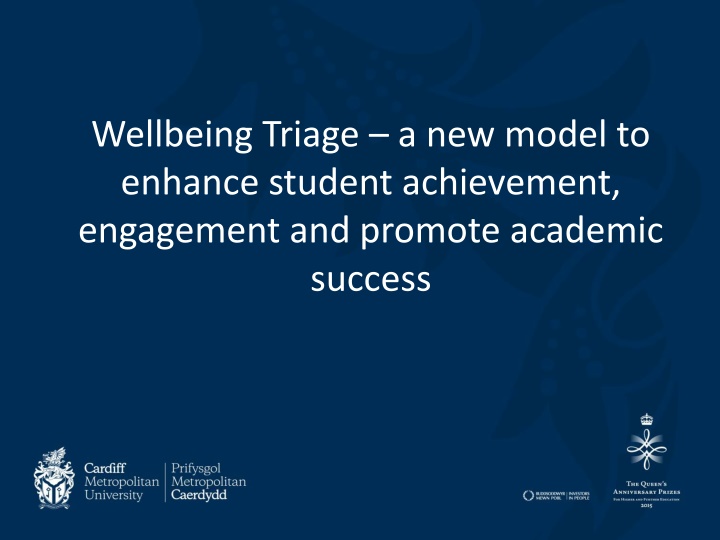
Enhancing Student Success through Wellbeing Triage Model
Discover how the Wellbeing Triage Model aims to improve student achievement, engagement, and academic success by addressing limitations in access, communication, and response prioritization. The model shifts from reactive to proactive mindset, empowering university staff to support students effectively. Learn about the triage process, assessment timescales, and current advancements in consolidated roles for better addressing student needs.
Download Presentation

Please find below an Image/Link to download the presentation.
The content on the website is provided AS IS for your information and personal use only. It may not be sold, licensed, or shared on other websites without obtaining consent from the author. If you encounter any issues during the download, it is possible that the publisher has removed the file from their server.
You are allowed to download the files provided on this website for personal or commercial use, subject to the condition that they are used lawfully. All files are the property of their respective owners.
The content on the website is provided AS IS for your information and personal use only. It may not be sold, licensed, or shared on other websites without obtaining consent from the author.
E N D
Presentation Transcript
Wellbeing Triage a new model to enhance student achievement, engagement and promote academic success
Why change? Dependence on prior knowledge of services Limited means of access Expectation was often incorrect or inaccurate Lack of communication between services (e.g. Counselling and Wellbeing) Waiting lists with no clear timescales Inability to prioritise response Confidentiality and disclosure issues
Shifting Mindset Proactive Reactive Limited by resources and demand Early intervention Promoting self-management Key Aims: empower staff across the university to support students and make appropriate referrals Make service more relevant, effective and accessible for students
The Triage Process Student receives email with guidance / timescales for response Request assessed by Senior member of team Student Completes Form Support available for queries and booking (ILO Drop-in) Appropriate services identified and offered to student Review and additional support offered as requested
Assessment Timescales Staff Initial Intervention Ongoing Support Crisis Immediate / urgent response within office hours Counselling Coordinator Clinical assessment Containment sessions GP / CMHT / Specialist services referral Wellbeing Appointment Wellbeing Advisor to identify and coordinate longer term support and liaison with student / support services / DSA / Fitness to Study Wellbeing Manager Senior Wellbeing Advisor Severe 48 hours Wellbeing Advisor Wellbeing Assessment / Interview to establish need Single session counselling External referral GP liaison / DSA Moderate 5 working days Wellbeing Advisor / Inclusive Learning Officer Wellbeing Assessment / Interview to establish need Self-help resources / referral Single session counselling Referral to additional university services GP liaison / DSA Mild 5 working days Wellbeing Advisor / Inclusive Learning Officer Wellbeing Assessment / Interview to establish need Self-help resources / referral Referral to additional university services
Where are we now? Consolidated roles to better address comorbidity Integrated Counselling and Wellbeing service, improved relationship / enhanced support Online presence MetHub / Website Developing workshops AYL / ER / Stress & Anxiety management Improved sharing of info - ISP s Developed links to statutory services New Pathways / IAS / CMHT s / GP s
How have we achieved this? Confidentiality and disclosure review Single point of entry to ALL services no prior knowledge needed Diagnostic context prioritise services Developed early intervention options Risk assessment tool informs referrals / timescales / interventions offered Clear expectations / process for students Quicker and more accessible support process Less admin focus resources appropriately
Impact for student. Achievement Earlier intervention = less support needed More efficient / informed referrals Improved academic outcomes Better communication with staff Managed health and wellbeing
Impact for student Engagement Supports disclosure Transparent and accessible Empowers student to make informed choices about managing their health Promotes a university wide culture of support Empowers staff to support students
Impact for student Success Better retention Improved positive outcomes Skills / strengths / self-management Increased confidence / self-esteem Promotes good practice across institution
Impact for staff Earlier intervention point for staff Supersedes Cause for Concern as includes risk assessment / internal referral tool Helps to facilitate and manage disclosures Addresses issues of confidentiality (work in progress) Ease of access Improved sharing of information / co-working Meet duty of care for all students NB: Please feel free to contact us for advice / updates / follow up about any student. We are always happy to discuss what we have done. The student gives permission for this.
The future Develop suite of interventions Proactive response to demand Evaluate impact + offer targeted support Work collaboratively with schools Look to develop tailored interventions Promote culture of support & inclusivity staff and student roles Promote good practice



